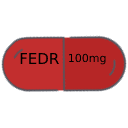Uses
Fedratinib is used to treat adults with certain types of myelofibrosis (MF; a cancer of the bone marrow in which the bone marrow is replaced by scar tissue and causes decreased blood cell production). Fedratinib is in a class of medications called kinase inhibitors. It works by blocking the action of the abnormal protein that signals cancer cells to multiply. This helps stop or slow the spread of cancer cells.
Side Effects Of Fedratinib
Fedratinib may cause side effects. Tell your doctor if any of these symptoms are severe or do not go away:
- nausea
- vomiting
- diarrhea
- constipation
- tiredness
- muscle spasms
- arm, leg, or bone pain
- headache
- weight gain
- dizziness
Some side effects can be serious. If you experience any of these symptoms or those listed in the WARNINGS section, call your doctor immediately or get emergency medical treatment:
- unusual bleeding or bruising
- fever, chills, cough, painful or frequent urination, or other signs of infection
- nausea, extreme tiredness, unusual bruising or bleeding, lack of energy, loss of appetite, pain in the upper right part of the stomach, yellowing of the skin or eyes, or flu-like symptoms
- shortness of breath, fast heartbeat, headache, dizziness, pale skin, confusion, or tiredness
Fedratinib may cause other side effects. Call your doctor if you have any unusual problems while taking this medication.
Warnings & Precautions
Before taking fedratinib:
- tell your doctor and pharmacist if you are allergic to fedratinib, any other medications, or any of the ingredients in fedratinib capsules. Ask your pharmacist or check the Medication Guide for a list of the ingredients.
- tell your doctor and pharmacist what other prescription and nonprescription medications, vitamins, nutritional supplements, and herbal products you are taking or plan to take. Be sure to mention any of the following: clarithromycin (Biaxin, in PrevPac), diltiazem (Cardizem, Dilacor, Tiazac, others), erythromycin (E.E.S., E-mycin, Erythrocin), idelalisib (Zydelig), indinavir (Crixivan), itraconazole (Sporanox), ketoconazole (Nizoral), metoprolol (Lopressor, Toprol XL, in Dutoprol, others), midazolam (Versed), nefazodone, nelfinavir (Viracept), omeprazole (Prilosec, in Zegerid), ribociclib (Kisqali, Kisqali, in Femera), ritonavir (Norvir), ruxolitinib (Jakafi), and saquinavir (Invirase). Your doctor may need to change the doses of your medications or monitor you carefully for side effects. Many other medications may also interact with fedratinib, so be sure to tell your doctor about all the medications you are taking, even those that do not appear on this list.
- tell your doctor if you have or have ever had liver or kidney disease.
- tell your doctor if you are pregnant or plan to become pregnant. If you become pregnant while taking fedratinib, call your doctor.
- do not breastfeed during your treatment with fedratinib and for at least 1 month after your final dose.
- if you are having surgery, including dental surgery, tell the doctor or dentist that you are taking fedratinib.
Fedratinib Dosage
Fedratinib comes as a capsule to take by mouth. It is usually taken once a day, with or without food. Taking fedratinib with a high fat meal may help to reduce nausea and vomiting. Take fedratinib at around the same time every day. Follow the directions on your prescription label carefully, and ask your doctor or pharmacist to explain any part you do not understand. Take fedratinib exactly as directed. Do not take more or less of it or take it more often than prescribed by your doctor.
Your doctor will order blood tests before and during your treatment to see how you are affected by this medication. Your doctor may increase or decrease your dose of fedratinib during your treatment, or may tell you to stop taking fedratinib temporarily or permanently. This depends on how well the medication works for you, your lab test results, and if you experience side effects. Talk to your doctor about how you are feeling during your treatment.
Other
Do not let anyone else take your medication. Ask your pharmacist any questions you have about refilling your prescription.
It is important for you to keep a written list of all of the prescription and nonprescription (over-the-counter) medicines you are taking, as well as any products such as vitamins, minerals, or other dietary supplements. You should bring this list with you each time you visit a doctor or if you are admitted to a hospital. It is also important information to carry with you in case of emergencies.
Source
All information has been provided courtesy of MedLinePlus from the National Library of Medicine and from the FDA.



